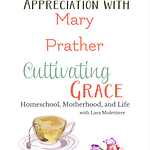I am grateful to be of service and bring you quality homeschool and homemaking content. I receive compensation through subscribers, curriculum sales, and affiliate links. As an Amazon Associate I earn from qualifying purchases.
Today's episode is brought to you by Audible. Get your free Audible Trial here.
Using Hymns to Teach Sound Theology
Oh come, let us sing to the Lord; let us make a joyful noise to the rock of our salvation! Psalm 95:1
Singing is something humans have been doing since God created us. It’s clear in Scripture that singing pleases the Lord.
Praise the Lord! For it is good to sing praises to our God; for it is pleasant, and a song of praise is fitting. Psalm 147:1
Charlotte Mason, in School Education says,
Perhaps we do not attach enough importance to the habit of praise in our children’s devotions. Praise and thanksgiving come freely from the young heart; gladness is natural and holy, and music is a delight. The singing of hymns at home and of the hymns and canticles in church should be a special delight; and the habit of soft and reverent singing, of offering our very best in praise, should be carefully formed.
It’s not just the infallible Scriptures that prove singing is important and influential in our lives. Science agrees! Secular scientists have been baffled for centuries by our draw to sing. Recent studies, though, are showing some pretty amazing things about singing-
releases endorphins, the hormone associated with feelings of pleasure.
releases oxytocin, a hormone that lowers stress and anxiety levels.
lessens feelings of loneliness and depression.
impacts quality of life.
It’s really no wonder we’ve been singing for thousands of years. It’s almost like God intentionally caused our bodies to respond to singing… ;)
Using Hymns to Teach Theology
Not only does singing bless us with all of the above benefits, it also helps us to retain information. Consider the alphabet song for example. A two year old is capable of singing the alphabet long before she has any idea what it is she’s singing about. You can find countless songs on YouTube and iTunes with the purpose of memorizing some kind of facts: multiplication tables, bones of the body, the days of the week, state capitals, etc.
Why not use singing to teach our children theology? And what better way to do so than to sing theologically sound hymns?
Hymns have a reputation of being chocked full of theology. In a lot of cases, this is true. Here’s some reasons why hymns stand out over contemporary music for learning theology:
Hymns use deep, meaningful, purposeful words.
Hymns don’t have bridges or overly repetitive choruses, focusing on the words rather than the music.
Hymns are written apart from the music, again emphasizing what’s being sung over the emotions of the music.
Hymns are inherently poetic, making the words not only beautiful, but easy to memorize.
Hymns are steeped in Scripture, some are even direct Scripture set to music.
Theologically Rich Hymns
Take a look at how these lyrics can teach our kids about God as our Creator in This is My Father’s World:
“This is my Father’s world, and to my list’ning ears, all nature sings and ‘round me rings the music of the spheres. This is my Father’s world: I rest me in the thought of rocks and trees, of skies and seas; His hand the wonders wrought.”
O For a Thousand Tongues to Sing reminds our kids of the work of Jesus:
“Jesus, the name that charms our fears, that bids our sorrows cease; ‘Tis music in the sinner’s ears, ‘tis life and health and peace. He breaks the pow’r of cancelled sin, He sets the pris’ner free; His blood can make the foulest clean, His blood availed for me.”
A favorite of ours, Amazing Grace, paints a beautiful picture of salvation:
“Amazing grace, how sweet the sound that saved a wretch like me. I once was lost but now am found, was blind but now I see.”
The attributes of God shine through in How Firm a Foundation:
“Fear not, I am with you, O be not dismayed; For I am your God, and will still give you aid; I’ll strengthen you, help you, and cause you to stand, upheld by My righteous, omnipotent hand.”
Back to the Word
A hymn isn’t automatically theologically sound. Remember- what makes teaching theology through hymns so great is the fact that the music and poetic lyrics help our kids remember these songs for years to come. If they aren’t teaching sound theology, we’ve defeated our purpose. As we teach our children, it’s vital that we hold everything up to the light of Scripture. Carefully test the words of the hymns against the eternal Words of God. If the hymn passes the test then...
“Come, Christians, join to sing alleluia! Amen!”
Let the word of Christ dwell in you richly, teaching and admonishing one another in all wisdom, singing psalms and hymns and spiritual songs, with thankfulness in your hearts to God. Colossians 3:16
Hymn Study Resources
We learn a new hymn every month with our Awaken to Delight morning time plans.
Favorite Books full of beautiful Hymns and Stories
Then Sings My Soul: 150 of the World's Greatest Hymn Stories
















Share this post